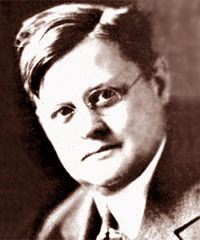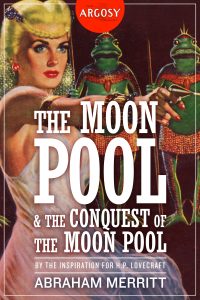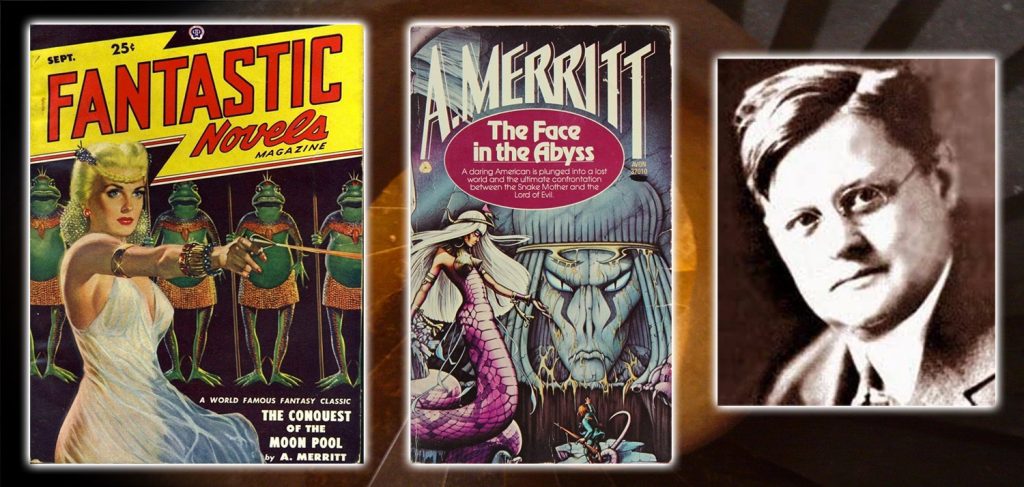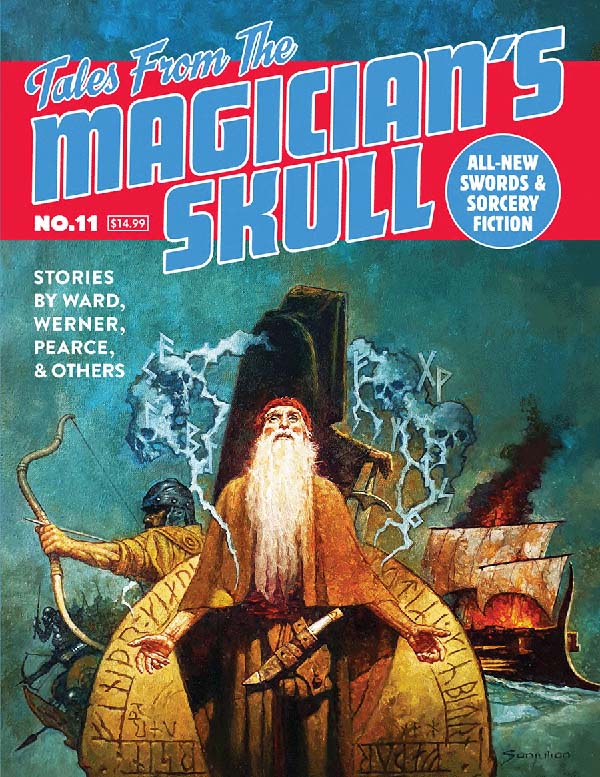Our Appendix N Archeology and Adventures in Fiction series are meant to take a look at the writers and creators behind the genre(s) that helped to forge not only our favorite hobby but our lives. We invite you to explore the entirety of the series on our Adventures In Fiction home page.
Adventures in Fiction: Abraham Merritt
by James Maliszewski
Of all the literary influences on D&D and DCC RPG, Abraham Merritt is perhaps the “most-influential of the least-known.” His work is rarely read in this modern time, yet he is named by Gary Gygax as one of “the most immediate influences on AD&D. Today, on January 20, 2020, the 136th anniversary of his birth, we provide a little more insight into this little-read but well-deserving author. You can also learn about all the Appendix N authors by listening to the Appendix N Book Club. For Merritt in particular, his most famous work, The Moon Pool, was recently covered in a special session on the Appendix N Podcast in which Joseph Goodman participated. You can find more about it HERE.

After listing all of the books and authors that inspired him, Gary Gygax concluded Appendix N of the Dungeon Masters Guide by stating, “The most immediate influences upon AD&D were probably de Camp & Pratt, REH, Fritz Leiber, Jack Vance, HPL, and A. Merritt.” Most of the writers he mentioned ought to be well known to devotees of fantasy and with good reason: their works form significant parts of the foundation upon which the genre was subsequently built.
Even if, by some unhappy circumstance, one has not read the stories of Robert E. Howard or H.P. Lovecraft, odds are nevertheless good that one knows of Conan the Cimmerian or the Cthulhu Mythos. Something similar could, I hope, be said of Jack Vance’s Dying Earth or Planet of Adventure or perhaps even of L. Sprague de Camp and Fletcher Pratt’s Harold Shea. All of these authors created an enduring character or place or even idea after which later writers could model their own creations, thereby establishing a clear chain of literary descent. Their influence on the development of fantasy is thus relatively easy to establish.
In the case of Abraham Merritt, though, that is more difficult to do. Partly, that may be because he produced comparatively few works of fiction. By profession, Merritt was a journalist and editor rather than an author, working for most of his career for The American Weekly. Indeed, he was one of the most successful—and highly paid—journalists of his era, making, according to Sam Moskowitz, $25,000 a year in 1919 and $100,000 a year at the time of his death in 1943. His busy career (and fondness for travel) prevented Merritt from producing as many works as other successful pulp writers of his time.

Nevertheless, over four decades, Merritt penned eight short stories and an equal number of novels. His first foray into fiction was a short story entitled “Through the Dragon Glass,” which appeared in the November 14, 1917 issue of The All-Story, the same magazine that had published the work of Edgar Rice Burroughs five years previously. Merritt followed up the success of his initial effort with other short stories, a couple of which he later expanded into novels and which remained in print well into the 1960s.
Unlike authors such as Howard or Leiber, Merritt’s stories focus less on a recurring character or characters (though the character of Dr. Goodwin does appear in two of his novels) and more on recurring themes. It is these themes, along with his lush, occasionally florid, prose that makes Merritt worth reading even now. H.P. Lovecraft was a huge admirer of both Merritt’s themes and his prose style, noting in a letter to R.H. Barlow that “he has a peculiar power of working up an atmosphere and investing a region with an aura of unholy dread.”
Merritt’s prose is, in fact, the first of a pair of reasons I would like to offer in support of why one should seek out his tales (all of which are now in the public domain and therefore easily accessible). Take, for example, this lengthy passage from his 1931 novel, The Face in the Abyss, in which he describes the titular face:

“From where he stood a flight of Cyclopean steps ran down into the heart of the cavern. At their left was the semi-globe of gemmed and glittering rock. At their right was — space. An abyss, whose other side he could not see, but which fell sheer away from the stairway in bottomless depth upon depth.
The face looked at him from the far side of the cavern. Bodiless, its chin rested upon the floor. Colossal, its eyes of pale blue crystals were level with his. It was carved out of the same black stone as the walls, but within it was no faintest sparkle of the darting luminescences. It was a man’s face and the face of a fallen angel’s in one; Luciferean; imperious; ruthless — and beautiful. Upon its broad brows power was enthroned — power which could have been godlike in beneficence, had it so willed, but which had chose instead the lot of Satan.
Whoever the master sculptor, he had made of it the ultimate symbol of man’s age-old, remorseless lust for power. In the Face this lust was concentrate, given body and form, made tangible…
And now he saw that all the darting rays, all the flashing atoms, were focused full upon the Face, and that over its brow was a wide circlet of gold. From the circlet globules of gold dripped, like golden sweat. They crept sluggishly down its cheeks. From its eyes crept other golden drops, like tears. And out of each corner of the merciless mouth the golden globules dribbled like spittle. Golden sweat, golden tears and golden slaver crawled and joined a rivulet of gold that oozed from behind the Face, to the verge of the abyss, and over its lip into the depths.”
It’s not hard to see why Lovecraft was so enamored of Merritt’s prose. His style is neither fish nor fowl, mixing many aspects of pulp literature into a unique elixir that’s remarkably intoxicating. As Lovecraft notes in the letter I quoted above, Merritt is a master of atmosphere and setting a scene. He takes the time to describe the environment in which his fantastic tales of lost races and eldritch horrors occur and it is this that truly set his stories apart from those of his contemporaries and successors. More so than most pulp writers, Merritt truly transports his readers into another world, using his prose to act as their eyes and ears.

Of equal importance to his prose are Merritt’s themes, most notably lost races and subterranean realms. Such ideas are commonplace now, in part because of the role Merritt played in promoting them, both through his fiction and his editorial work on The American Weekly, which often included stories of scientific “marvels” and inexplicable events. His admirer Lovecraft readily acknowledged the debt he owed to Merritt’s stories, particularly “The Moon Pool” (which, interestingly, was also noted by Gygax as a favorite of his), so there’s a sense in which the Cthulhu Mythos as it came to be might not have existed without Merritt. Similarly, Richard Sharpe Shaver, most famous for having written “The Shaver Mystery” in 1947, seems to have believed that Merritt’s stories were not truly fiction but rather fictionalized accounts of things Merritt had actually experienced while on his world travels. Shaver’s own theories of subterranean realms and ancient races were themselves widely influential, including on Dungeons & Dragons, whose derro race is certainly derived from Shaver’s own “dero” (short for “detrimental robot,” called such because of their robot-like behavior).
Merritt’s stories are full of strange lands hidden from the prying eyes of modern men and where mystery and horror still hold sway – as well as unearthly wonder and beauty. I cannot help but think that the peculiar locations he conjures in words are, at least in part, a reflection of his own experiences in traveling the world. His prose, I think, ably demonstrates the attraction that the weird holds, despite the dangers that it also brings with it.
There can be no doubt that the stories of Abraham Merritt are occasionally hard going for the contemporary reader. Yet, much like the haunted lands he depicts in them, there is wonder and beauty to be found within them, if one is willing to forge ahead.
If you enjoyed this article, be sure to have a look at our other articles on other Adventures in Fiction authors.





